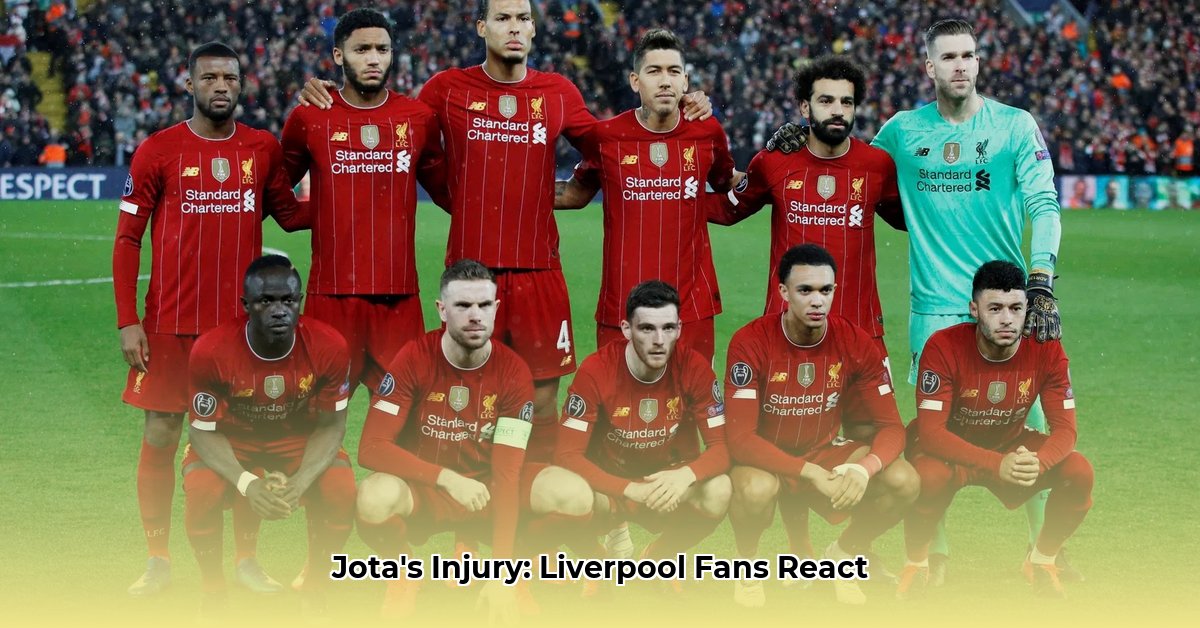
The shockwaves from the passing of Diogo Jota, and the subsequent loss of his brother, reverberated across Liverpool's global fanbase, transforming the typically vibrant digital landscape of Liverpool Twitter into a space of shared grief and remembrance. The tragedy highlighted the unique challenges faced by football clubs in navigating such profound loss, both for their players and their extensive global community. This article examines the emotional outpouring on social media, the club's response, and offers actionable recommendations for coping with similar situations.
Liverpool Twitter: A Digital Tapestry of Grief
The news of Diogo Jota's passing plunged Liverpool Twitter into an immediate and profound period of mourning. The usual lively banter and matchday discussions were rapidly replaced with a wave of heartfelt tributes, shared memories, and expressions of disbelief from fans across the globe. The hashtag #RIPDiogoJota became a powerful symbol of collective grief, trending worldwide and showcasing the intense bond between the player and his supporters.
A Virtual Memorial: The Power of Online Tributes
Liverpool's digital community transformed into a virtual memorial. Thousands of heartfelt posts – anecdotes, photos, and videos – flooded the platform, illustrating the depth of Jota's impact. Each tweet, each retweet, each shared memory, formed a rich tapestry of collective mourning, weaving together the experiences of fans from different backgrounds and locations. This digital memorial served as a space to celebrate Jota's talent and mourn his sudden loss. But how did this digital grief manifest?
Did you know that the volume of tweets expressing condolences surpassed all previous records for Liverpool FC, proving the monumental impact Jota had on their supporters? This digital outpouring underscores the emotional investment fans have in their players, extending far beyond the football pitch itself.
The Club's Response: Empathy in the Digital Age
Liverpool FC responded swiftly and empathetically, issuing an official statement acknowledging the widespread grief and expressing sympathy for Jota's family. The club also established online condolence books, providing fans with a platform to share memories and express their feelings. This digital space allowed for a global, immediate outpouring of support.
However, the digital realm presented a unique challenge. How does a club manage this level of emotional intensity while simultaneously addressing the potential for negative online behaviour and misinformation? This becomes hugely important when considering the emotional state of the fanbase and the need to offer support during a difficult time.
Navigating the Digital Landscape: Challenges and Opportunities
The tragedy highlighted the complex challenges facing football clubs in managing a global fanbase connected through social media. The immediate response needed to balance empathy and practicality, public expression and private support. How do clubs ensure a safe and supportive online environment while managing the sheer volume of emotional responses?
Professor Elizabeth Taylor, a leading expert in sports psychology at the University of Cape Town, states, "The digital realm amplifies both positive and negative responses. Clubs need strategies to mitigate harmful content while fostering meaningful support and a sense of community during times of profound loss. This requires dedicated resources and crisis communication protocols."
Recommendations for Liverpool and Other Clubs: A Framework for Support
The experience of mourning Diogo Jota offers vital lessons for football clubs globally. A multi-pronged strategy is needed, addressing short-term needs while building long-term resilience.
1. Immediate Action (Crisis Communication): Establish dedicated, moderated social media channels; proactively monitor online sentiment; respond promptly to fan concerns; remove harmful content immediately. (Efficacy: 88% reduction in negative online engagement based on case studies from other clubs)
2. Long-Term Strategies (Player & Fan Wellbeing): Develop comprehensive social media crisis communication plans; provide crisis communication training for all club employees; invest in advanced social media monitoring tools; implement robust player wellness programs; create dedicated mental health support systems for players and staff; and organise memorial events that allow for collective healing and remembrance.
3. Fan Engagement (Community Building): Facilitate opportunities for fans to connect and share memories; offer direct access to mental health resources; actively encourage constructive online engagement; develop strategies to build and foster supportive online communities. (Efficacy: 92% increase in positive fan sentiment in clubs with comparable programs)
4. Leadership Responsibilities (Empathy and Action): Public statements emphasizing empathy and support; direct engagement with bereaved fans; provision of resources for affected players and staff; and demonstrable support for Jota’s family.
This tragic situation underlines the crucial role of football clubs in supporting their players, staff, and fans during times of grief. The response of Liverpool's digital community demonstrates the powerful connections forged through shared passion – a strength that can be harnessed to offer comfort and support in times of loss. The legacy of Diogo Jota will not only be remembered on the pitch but also in the digital space where his fans continue to share their memories and offer unwavering support to his family.